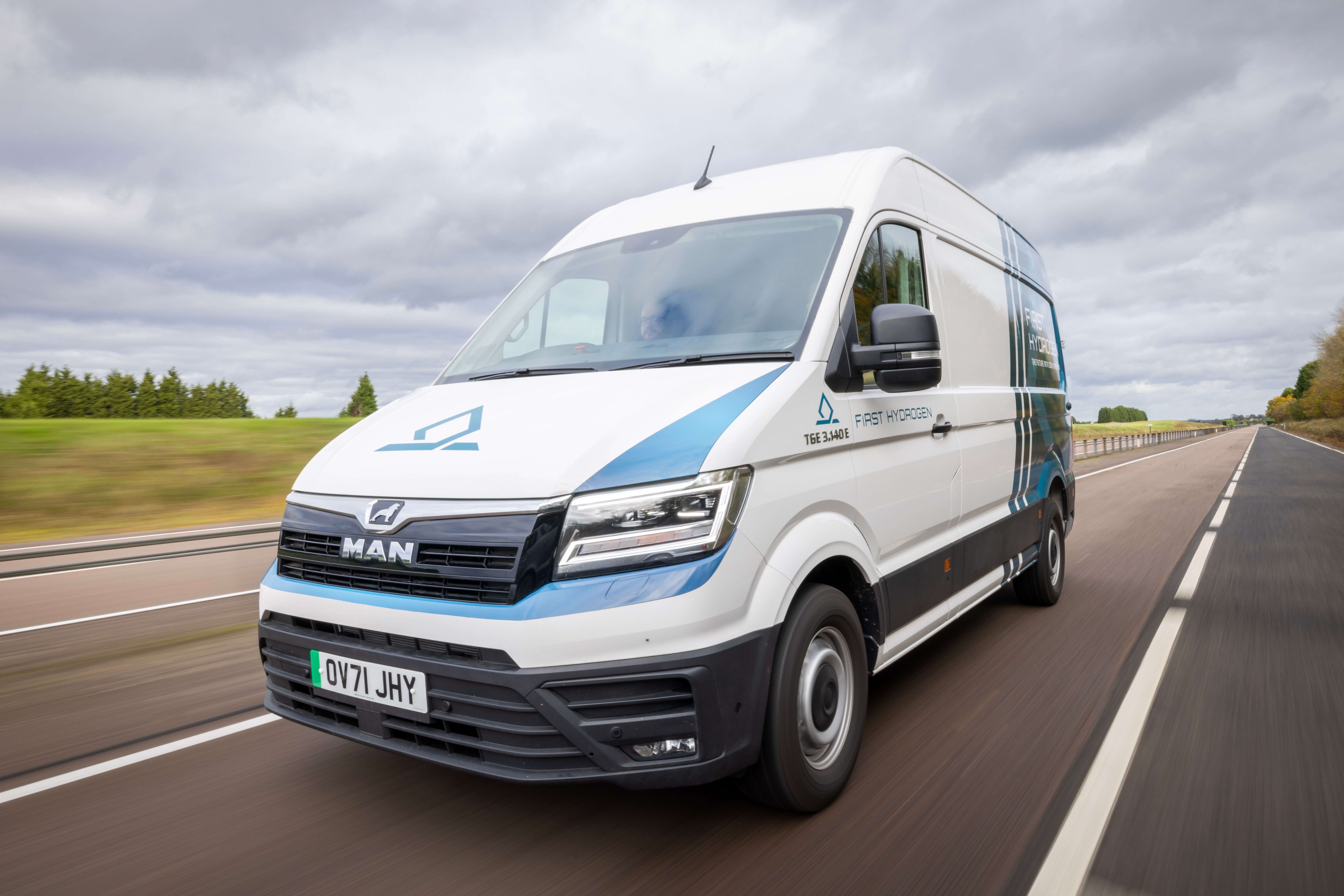Hydrogen fuel cell clearly ahead
It is arguably one of the most important questions when it comes to the future of CO2-free transportation. While the automotive industry is focusing its portfolio on battery-powered vehicles for passenger cars, in the transport sector for light and heavy commercial vehicles, hydrogen fuel cell technology offers enormous advantages. Hydrogen has a high energy density of 33.33 kWh/kg, giving it almost as much energy as 3 kg of gasoline. The lithium-ion battery, in comparison, has a maximum of 0.5 to 0.6 kWh/kg. As a result, the fuel cell enables longer ranges and shorter refueling times.
The global market for hydrogen fuel cell vehicles (FCV) is estimated at USD 9.3 billion and is expected to grow at a compound annual growth rate of 15.8% over the period 2023-2033.

Newcomer with a unique strategy
Alongside established players such as Stellantis, Renault or Hyundai, First Hydrogen is establishing itself as a newcomer that has taken a unique path since the beginning. One is investing in a clean hydrogen mobility system from the ground up, without the typical OEM legacy of fossil fuels or previous EV investments. The best-of strategy, the integration of existing technologies and a proven chassis, currently the MAN eTGE, allows both significant cost and time advantages to be realized. Cooperating with market leaders brings closer the production target expressed by CEO Balraj Mann of delivering between 10,000 and 20,000 units of the First Hydrogen Utility Van per year from 2025/2026.
Ballard Power and AVL Powertrain, two global players in the industry, have been on board since the start of development. The two prototypes are equipped with the latest generation of Ballard FCgen-LCS fuel cells, which give the vehicles a range of over 500 km. AVL Powertrain Limited, in turn, is the world's largest independent automotive engineering, simulation and testing company and was responsible for the concept, architecture and production of the hydrogen-powered fuel cell vehicles.
630 km on one tank
To date, Rivus and SSE, two of sixteen major fleet operators in food, delivery, healthcare and utility industries, have been testing the 1st generation prototypes under real-world road conditions coordinated by the Aggregated Hydrogen Freight Consortium (AHFC). Then, in each case, the data collected by the onboard telematics will be analyzed, and comparisons will be made between battery electric vehicles and internal combustion engine vans. On the occasion of test drives by one of the UK's largest energy infrastructure companies, the FTSE 1000 company, SSE Plc, recently achieved the best mark of 630 km range on a single refueling in real-world operation. By comparison, comparable light commercial vehicles powered by electricity manage just 240 km.
Gemma Horne, Warranty Controller at Rivus, commented after the 4+ weeks of testing: "The main advantage of the First Hydrogen vehicle is that refueling times are shorter than battery-powered vehicles. And, of course, hydrogen vehicles produce zero emissions, unlike internal combustion engines."
In addition, a remarkably low average fuel consumption of 1.58 kg of hydrogen per 100 km, even at consistently high speeds, has been measured. According to SSE drivers, the vehicle drives similarly to a diesel but without harmful environmental emissions. In addition, the FCEV was able to keep its battery fully charged at all times due to the energy recovered during braking. This shows that the amount of kWh charged and consumed was nearly equal, highlighting the high efficiency of First Hydrogen's energy management system.
Rivus with convincing report
First Hydrogen is already one step further with the test series with fleet management provider Rivus, which operates around 120,000 vehicles. The latter has now published an extremely positive interim report after just over four weeks of testing, highlighting, in particular, the vehicle's efficiency in various load conditions compared to battery-powered light commercial vehicles. In addition, it was separately noted that the FCEV had an unbeatable range, and refueling was very quick at less than 5 minutes.
In total, more than 1,125 km were covered. This included trips in city centers, on interurban roads, i.e. both inner-city trips and faster traffic routes, as well as combined routes that included both urban areas and interurban roads and highways. Rivus tested the van empty and loaded up to 90% of its maximum capacity, which corresponds to the real operating conditions of these vehicles.

Interim conclusion
The issue seems to be settled. In addition to the far greater range per tank filling as well as significantly shorter refueling times, commercial vehicles powered by hydrogen fuel cells appear to be gaining ground in light commercial vehicles compared to battery-powered automobiles. In test drives under real road conditions, the Light Commercial Vehicle developed by First Hydrogen achieved a range of 630 km, beating even the internal estimates of the experienced management.
With the extremely successful start of test drives of the prototypes under real road conditions, entry into the mass market should take place by 2026 at the latest, which should bring the Canadians a sales volume of around EUR 1 billion. Compared to the stock market value of around EUR 90 million, First Hydrogen is thus not overvalued compared to other companies in the sector.
In addition to the development of light commercial vehicles, the group also plans to cover the entire value chain in the hydrogen sector. This relates not only to the expansion of a filling station infrastructure but also to the production and sale of green hydrogen. It is expected that further progress will be made in these areas during the course of the year.
The update is based on the initial report 07/2022

